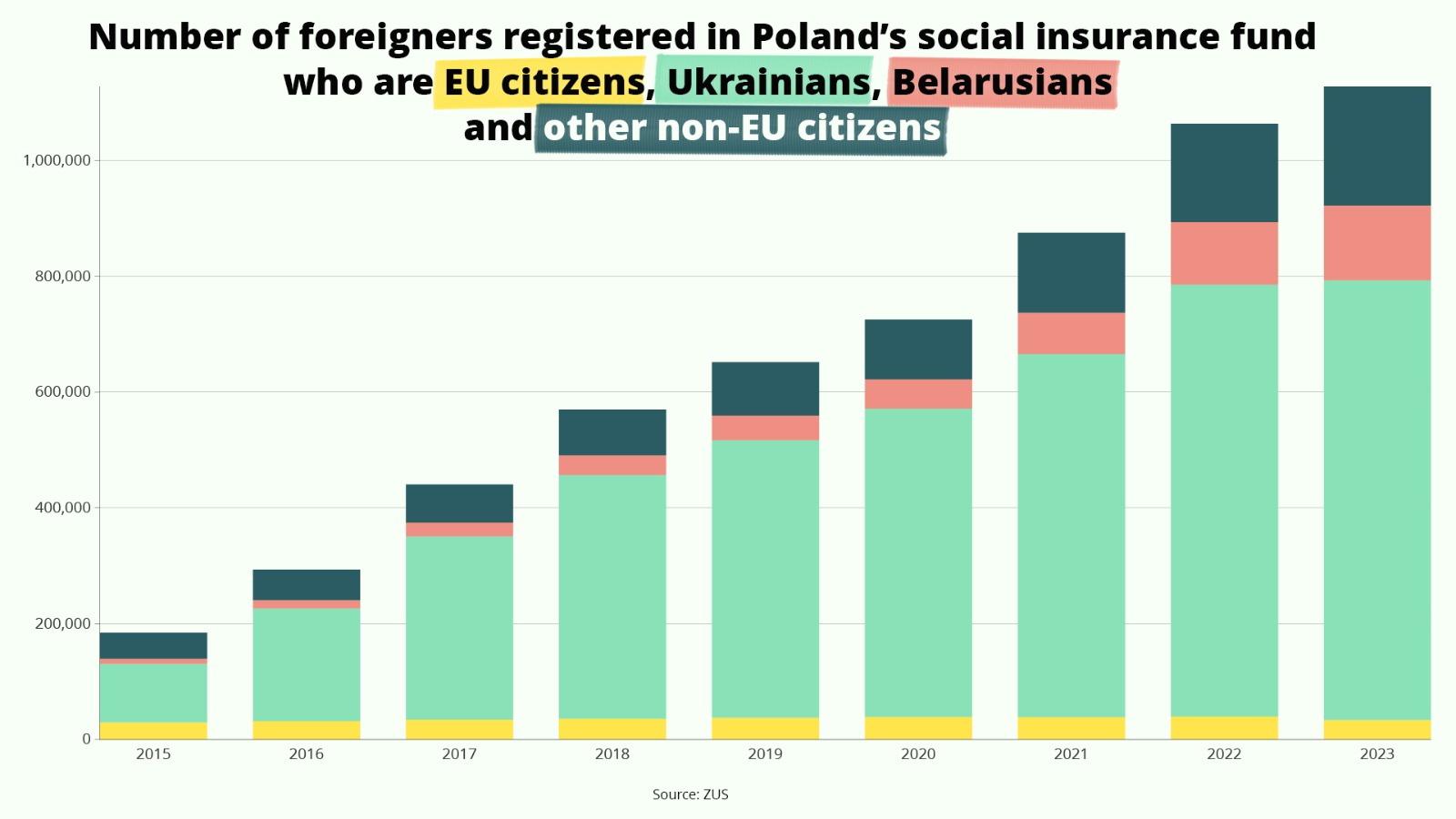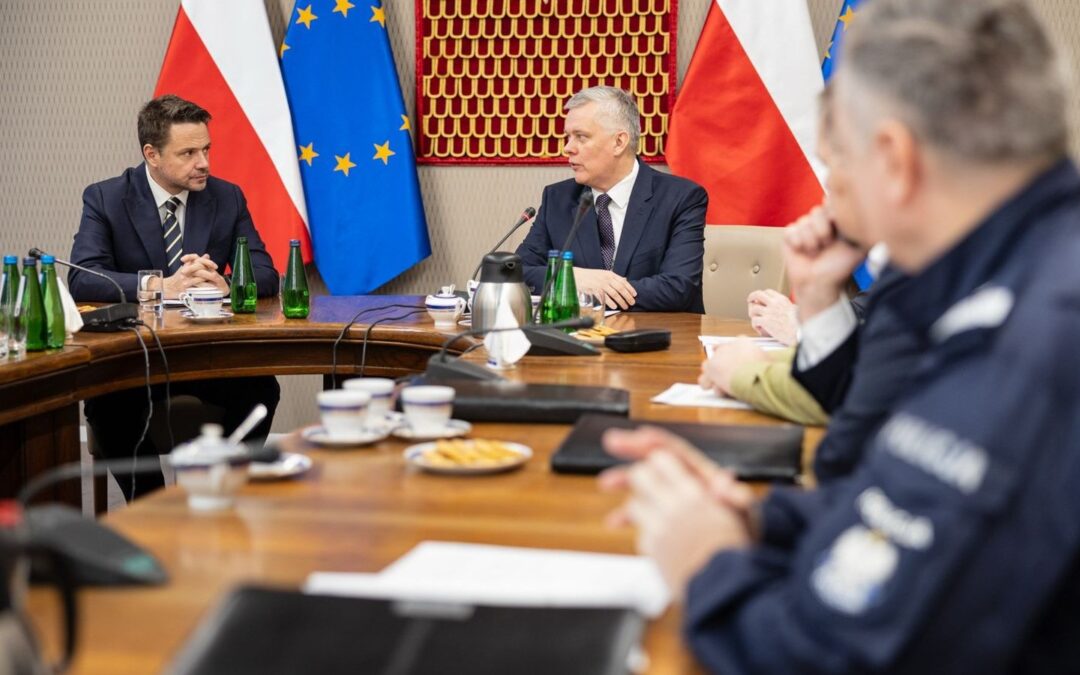Keep our news free from ads and paywalls by making a donation to support our work!

Notes from Poland is run by a small editorial team and is published by an independent, non-profit foundation that is funded through donations from our readers. We cannot do what we do without your support.
Poland’s interior minister and the mayor of Warsaw – who is also the main ruling party’s presidential candidate in May’s presidential elections – have declared a “zero tolerance” approach to crimes committed by immigrants.
They note that foreigners made up 5% of suspected criminals detained in Poland last year. However, the data they cited also indicates that foreigners make up around 8% of Poland’s population and that the number of suspected foreign criminals actually fell in 2024 compared to a year earlier.
Minister @TomaszSiemoniak podczas konferencji prasowej w #MSWiA ⤵️
💬 Według policyjnych statystyk w 2024 r. wśród wszystkich podejrzanych o przestępstwa w Polsce, 5% to obcokrajowcy. To dostatecznie duża liczba, by zajmować się tym w sposób szczególny. pic.twitter.com/ED4SNY91YX
— MSWiA 🇵🇱 (@MSWiA_GOV_PL) February 11, 2025
The issue of immigrant criminals has become a major talking point after a report earlier this month that Georgians, in particular, were responsible for a return to the kind of violent organised crime that was common in the 1990s during the post-communist transition.
Today, Tomasz Siemoniak, the interior minister, and Warsaw mayor Rafał Trzaskowski addressed the issue during a joint press conference that followed a meeting with law-enforcement agencies that deal with organised crime.
“We cannot allow organised criminal groups consisting of foreigners to disrupt public order and reduce the level of security,” declared Siemoniak. “I want to assure you that for the police and other agencies – [such as] the border guard and Internal Security Agency (ABW) – this is an absolute priority.”
The minister noted that, according to police data, 5% of all people suspected of carrying out crimes in Poland in 2024 were foreigners. “This is a large enough number to deal with it in a special way,” he added.
“Over the last 15 years, the number of foreigners in Poland has increased significantly – from about 100,000 to 3 million,” said Siemoniak. “The scale of the challenges for the security services and local authorities is enormous.”
In recent years, Poland has experienced a wave of immigration that is unprecedented in its history and among the highest of any country in Europe. For the last seven years running it has issued more first residence permits to immigrants from outside the EU than has any other member state.

The precise number of foreigners in the country is difficult to ascertain, given the temporary nature of some migration. However, data released this week by Statistics Poland (GUS), a state agency, showed that in August last year, over a million foreign workers were registered in Poland, making up 6.8% of the workforce.
However, the Warsaw Enterprise Institute (WEI), a think tank linked to the Union of Entrepreneurs and Employers (ZPP), estimated in a report last month that there could actually be between 3.5 million and 4 million immigrants in Poland in total.
Given that Poland’s population, according to GUS, currently stands at 37.5 million, WEI’s figures indicate that immigrants make up 9.3-10.7% of the population. Siemoniak’s figure of three million foreigners would represent 8% of the population.
Poland is establishing 49 "foreigner integration centres" to help coordinate services for the country's growing number of immigrants.
The EU-funded facilities will provide courses in the Polish language and adaptation as well as offering legal advice https://t.co/unuT7f5Bvv
— Notes from Poland 🇵🇱 (@notesfrompoland) October 11, 2024
Data obtained this week by broadcaster RMF from the police show that, in 2024, 16,437 foreign nationals were detained on suspicion of committing a crime. That was 857 lower than in 2023. The most common suspected crime was drink driving, which constituted 4,214 (26%) of cases.
Among foreigners detained, the highest proportion were Ukrainians (9,753, or 59%), who are Poland’s largest foreign national group, making up around two thirds of immigrants. In second place were Georgians (1,780, or 11% of all detentions), followed by Belarusians (1,122, or 7%).
At today’s press conference, Siemoniak stressed that “we do not consider migrants to be criminals by nature”. He noted that, among the 5% of detained suspects who are foreigners, most are accused of driving offences or not having the required permits. “These 5% are not only robberies and murders.”
Last year, news website Forsal noted that, despite mass migration to Poland in recent years, the overall number of crimes is far lower than 20 years ago. In 2004, for example, 50,000 robberies were reported compared to just 4,000 in 2023. Assaults fell from 14,400 to 2,200 over the same period.
The number of foreigners in Polish prisons has nearly doubled in less than four years amid unprecedented levels of immigration to Poland.
Most foreign inmates are Ukrainians, Georgians and Belarusians , who are also Poland's three largest immigrant groups https://t.co/wPWIfJwDzP
— Notes from Poland 🇵🇱 (@notesfrompoland) July 19, 2024
Speaking alongside Siemoniak today, Trzaskowski declared that “it is important to send a clear signal: zero tolerance for foreigners who come into conflict with the law”.
He said that over 1,000 people had been deported last year and that police in the capital have launched additional patrols. Such actions, he argued, have helped bring down the number of crimes committed by foreigners.
Today, neither he nor Siemoniak announced any specific new policies to deal with the issue. But at the weekend, Siemoniak revealed that he and the justice minister, Adam Bodnar, are “preparing a plan for further decisive reactions to crime by foreigners in Poland, especially organised crime”.
Poland is experiencing a growing wave of "imported organised, brutal crime" carried out by some immigrants, in particular from Georgia, says the interior minister.
He blamed the "uncontrolled influx of migrants" allowed by the former government https://t.co/DPMktNKHdk
— Notes from Poland 🇵🇱 (@notesfrompoland) February 4, 2025
Trzaskowski is the candidate in May’s presidential elections for the centrist Civic Coalition (KO), Poland’s main ruling group.
He has long been regarded as standing on the more socially liberal wing of KO. However, he has presented a tough stance during the campaign, including calling for an end to child benefits for Ukrainian parents who do not work.
The KO-led national government has also talked tough on migration, blaming the previous Law and Justice (PiS) administration for allowing uncontrolled mass immigration and adopting a strict new migration and asylum strategy in December.
Poland's government has approved tougher new migration rules intended to "take back control" of borders, including by suspending the right to claim asylum.
"We have launched a ruthless fight against illegal immigration," said Prime Minister @donaldtusk https://t.co/RSTP293oRb
— Notes from Poland 🇵🇱 (@notesfrompoland) December 18, 2024

Notes from Poland is run by a small editorial team and published by an independent, non-profit foundation that is funded through donations from our readers. We cannot do what we do without your support.
Main image credit: MSWiA/X

Daniel Tilles is editor-in-chief of Notes from Poland. He has written on Polish affairs for a wide range of publications, including Foreign Policy, POLITICO Europe, EUobserver and Dziennik Gazeta Prawna.



















